The Pride of Lions
Roger Q. Mason
Theatre Rhinoceros
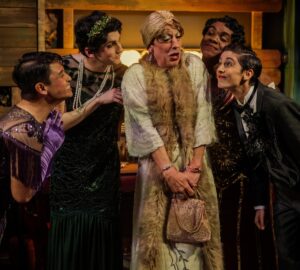
On October 1, 1928, Mae West opened her latest play, The Pleasure Man – a comic, murder mystery with a climatic Drag Ball spectacle, resulting in the show being raided in its first two – and only – performances before being permanently shut down by the New York vice squad. Over fifty performers were hauled off to jail, most soon released except for the ground-breaking queens in the final scene.
Theatre Rhinoceros opens a world premiere play, The Pride of Lions, by Roger Q. Mason that imagines what being slammed into one jail cell was like for five of those transgender and gender non-conforming performers. While the play’s premiere has some issues due to its tight performance venue and to some melodramatic, over-kill acting, the voices given to these early twentieth century, Broadway hopefuls are voices important to be heard, given their amalgamation of gender, sexuality, nationality, and race. That is especially true given the twenty-first-century discrimination and life-and-death issues today facing those same types of people in state after state across the country.
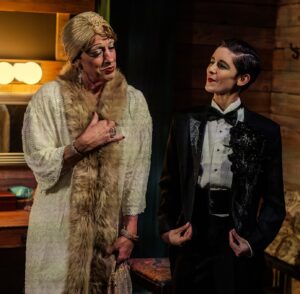
We meet the full-of-hope-and-excitement, drag performers in a small, dressing room as they arrive for a tryout in front of the great Mae West herself. Madam Red Hook (Michael DeMartini) moves with the dignity and grace of the grand dame in her 70s that she is – a kind-hearted transplant from Charleston, South Carolina who grew up as a white boy on a slave-holding plantation but who has somehow survived her many subsequent decades as a transgender woman.
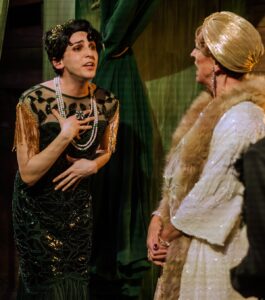
Gracie (Brendon Looney) is a seventeen-year-old who was known as Mr. Twinkle Toes in her hometown of Iowa City for her toe-tapping prowess, who has escaped to New York because high heels are more to her liking than the boy’s shoes she wore growing up. She has been working the streets to get by and hopes this Broadway stage might be her ticket to Hollywood dancing stardom.

Shasta (Frances Domingos) is a twenty-something, Mexican-American, gender-fluid, soft-shoe dancer who once worked in Madam Red’s “Meow Manor,” known in the South as a ‘cathouse.’ Lady Molasses (Sean Prescott) is an elegant, deep-voiced, Black drag performer, once known in her hometown of Rosewood, Florida for her comedy and her singing – that is until the all-Black town was burned to the ground by a white mob. Also hoping to impress Miss West is a soft-spoken, male-presenting immigrant from the Philippines (Patrick Chico) who arrives in his Wall Street, three-piece-suit, only to change into the silks and heels of “Marla,” a persona he has found sexually pleasing both to himself and to his girlfriend.
As they wait to go on, tensions rise and fall as the high-strung, nervous personalities at first clash and claw before finally melding into a more supportive group of sisters, largely to the peacekeeping attempts and wiser words of the more experienced and seasoned Madam Red and Lady Molasses. And though we get to be a part of their successful Great White Way tryouts, the careers of new “dolls of Broadway” are short-lived as their debut is interrupted mid-show by New York’s finest – or not – in uniform.
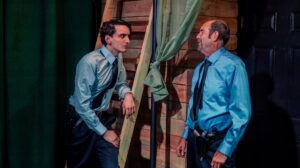
Kim Larsen is chilling and appropriately disgusting as the sleazeball Lieutenant Gray, a gun-toting officer who is so more than ready to mimic, taunt, and abuse the five prisoners he is here to arrest and later to torture with his insinuations and threats in their jail cell. In contrast, his partner – the more junior, newly promoted Sergeant Hammer (Nic Moore) – is much more respectful and is seemingly even embarrassed in what he is called on to do in rounding up and jailing the Broadway ladies. He is quick and bold to intercede in order to calm down his ranting and raging boss in order to deter some of Gray’s menacing harassment. But we already know that Sergeant Hammer is sympathetic not only by nature but also because he has a secret, closeted self and a deeply felt connection to one of those he must now handcuff.
We have learned this in a prelude scene that unfortunately does not work well in the awkward layout of the tiny space where Theatre Rhinoceros now performs. A hot love scene between two intertwined, naked bodies occurs to the audience’s left and is mostly impossible to see from the twenty seats of the small theatre. Prolonged, ever-increasing groans and cries of lovemaking have little context as some of us occasionally can only make out a raised arm or leg through the mesh curtains at the end of the room. The scene has many issues, given the exaggerated, almost comical sex sounds – making the entire, opening episode seem a gratuitous attempt to peak the interests of a mostly LGBTQ+ audience.
Unfortunately, other parts of the play suffer from this setting where the first of only two rows of seats means actors are literally in the faces of many audience members, often brushing up against the legs and feet that we try our best to keep out of their way. The floor that serves as stage is not much wider than the aisle of some larger theatres and makes it terribly difficult for seven actors to occupy it, move around, sometimes dance, and even fight on it. Certainly Ely Sonny Orgquiza has done all that is possible as director to make the space work; but on a larger stage, the intent and possibility of the playwright’s script would surely have a much better chance to succeed.
The closeness of the actors combined with the high drama, often heart-breaking nature of the story also means that at times, the emotions expressed – be they the snappy and snippy back-and-forth of rival drag queens or the tearful reactions of those jailed given the horrors occurring to them – too often come across as over-done and exaggerated. Some individual actors would benefit much in their performance if prompted to back off just a bit in order to increase their effectiveness of portrayal by a lot.
While each of the cast members certainly has moments to be commended as they portray situations and tell stories that no one should ever have to endure in any era, particular kudos go to the overall performances of Michael DeMartini and Sean Prescott as Madam Red Hook and Lady Molasses, respectively. In many ways, their characters are the most authentic, memorable throughout; and their individual, background stories as told by each are profound and heart-rending.
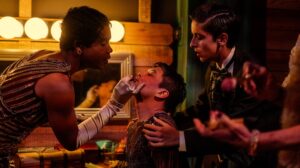
Lana Palmer populates as Sound Designer the evening with the songs and music of the Roaring 1920s, giving wonderful and uplifting context to times that were hopeful for a short while but where acceptance of those different was too short-lived. Wendell C. Carmichael’s costumes fabulously dress each character in the manner of the script’s intent – be it whimsical, sophisticated, dowdy, or evil. The wigs and make-up designs of Lyric Cross play huge roles in this particular production as each person readies for the big tryout moment in Mae West’s spotlight.
Roger Mason has embedded in the script a number of descriptions by various characters that speak powerfully not only to their lives as gender-bending, transgender people in their 1920’s world, but sound as if they might be said by their likened descendants trying to maneuver through their lives in 2024. Gracie says, “We are the salmon of mankind; we’re supposed to swim upstream.” Shasta describes the societal loneliness and isolation of their gender fluidity by noting, “When you soar, you fly on your own; when you fail, you crash splat on your face on your own; nobody knows you when you’re down and out.” And cross-dressing Marla sums up her life as, “Those of us on the other side of Rainbow Fantasy Land, we work to survive … we sacrifice … And every now and then, we get to be a bit of who we are.”
With words like these, The Pride of Lions often provides a gut-punch of just how difficult it was then – and still is now – for those folks not white, not straight, not cis to be accepted for just who they are, human. Roger Q. Mason also makes it clear that when the voices of LGBTQIAA people unite, individual lions and lionesses have the potential to become full of pride as a pride. And while the Theatre Rhinoceros premiere is sometimes a bit uneven, the worthy intent is evident; and the huge effort to bring this newly scripted story to the stage is highly admirable.
Rating: 3.5 E
The Pride of Lions continues in a world premiere, ninety-plus-minute (no intermission) performance by Theatre Rhinoceros, 4229 18th Street, San Francisco. Tickets are available at www.therhino.org.
Photo Credits: Seth Dorcey
